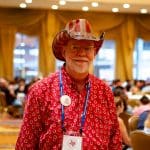Russ made a lasting impact on the stuttering community, and this heartfelt tribute from Lee reflects the impact a 40-year friendship had on these two.

By Dr. Lee Reeves, DVM
It was a chance meeting. In 1984, my daughter’s high school had an open house, and my wife and I helped host. As I stood quietly sipping on a glass of punch, I heard a voice with a distinct and recognizable pattern: stuttering! As a fellow member of what the famous speech pathologist Charles Van Riper called “the fraternity of the tangled tongue,” my ears were constantly listening to the speech patterns of others. I turned around and saw a gentleman talking with someone -and doing an excellent job of stuttering.
When his conversation ended, I walked over, introduced myself, and shared that we had something in common. “Oh?” he said. I replied, “Yes, I also stutter.” He gave me a sheepish look and said,” OK???”… as if to indicate “why are you telling me this?” I explained that I was currently leading the Dallas Association of Adult Stutterers, a self-help group I had helped create just two years prior. I told him we met once a month and that I would love for him to come. His answer was short and clear. “Thanks, but no thanks.” He told me he was fine and didn’t need to be associated with such a group.
He was clearly uncomfortable speaking to me, so I said it was a pleasure meeting him and wandered off to resume my duties as a host.
As fate or divine intervention would have it, he and I would cross paths again very soon. At that time, I was a veterinarian, and my clinic was close to this gentleman’s home. One day I walked into an exam room to greet new clients who had just gotten a puppy, Russ and Stachia Hicks. I’m not sure he recognized me, but I recognized him. After performing my professional duties regarding their newly acquired little dachshund, I reminded him where we met and shared more about our support group. Again, I invited him to the next meeting the following evening. I told him that while it was obvious that he was very comfortable with his speech, many fellow stutters were not. I explained that even though he didn’t need the group, many group members needed to hear his story. I even offered to come by and pick him up! As he contemplated his answer, I blurted out, “Great… I’ll come by about six on Tuesday”.
Our first ride to the meeting was filled with small talk about where he was from, who he worked for, etc. The conversation to answer those two questions probably took most of the forty-minute drive- between us and our stutters.
On the way home from the meeting, I asked Russ his opinion of the evening. He told me he thought it was “fine.” When we arrived at his home, I wondered if he would like to go again next month. Again, Russ kindly replied, “Thanks, but no thanks.”
As luck would have it, puppies need check-ups and vaccinations every three weeks. When Russ brought his pup back for its next check-up, it coincided with our group’s next meeting. When I brought it up after the exam and offered to drive him again, he reminded me that he was not interested. I told him I respected that, but several members contacted me after the last meeting. They said they enjoyed having him there and hoped he would come back. Again, Russ might be helpful to others. Once again, Russ reluctantly agreed, and we drove to a second meeting.
I learned more about Russ on our second drive. He had had a significant stutter since early childhood, and to his knowledge, no one else in the family stuttered. He spent a few summers at a famous camp in Michigan for stutter kids. The story was always the same. He’d come home more “fluent” but would quickly return to his natural struggle to speak. Both he and his parents had become frustrated. He also had a variety of therapy sessions well into his college years. All to no avail. As the evening ended, I discovered that Russ’s opinion of the group was similar to the first. I dropped him off and thanked him for going with me.
The final puppy check-up could have been more uneventful. I was trying to decide whether to jeopardize my professional relationship with my new client but decided to take the risk. I told him that, once again, some members had appreciated his attendance and felt inspired by his story. Indeed, Russ had many successes despite his significant struggles with speech. I encouraged him to give the support meetings one more try, and I agreed that if he still did not think the meetings were beneficial, I would leave him alone and not mention it again. Russ decided to come “one more time.” I should have admitted to him that actually no one had called me after either meeting, but I never did. The idea that he could inspire others was the hook for Russ, but regardless of the reason, that third meeting was all he needed; thus, we started our monthly drives and a 40-year close friendship.
Our Dallas Association of Adult Stutterers continued to grow. We eventually learned about the National Stuttering Project and became the Dallas Chapter of the NSP. Russ, along with another of our members, Joseph Diaz, was the first from Dallas to attend the annual NSP convention in 1986. A few years later when I stepped down from leading our Chapter, it was Russ and Joseph who volunteered to co-lead.
Russ and I often decided on the meeting topics for the night on our monthly drives. It never mattered what the planned topic was because when we would break into smaller discussion groups, each group would invariably wander off-topic in their discussions. That was fine for us because the goal was to encourage and allow everyone to talk and share.
My favorite Russ-ism occurred on one of our drives. We were thinking about what the topic for evening should be. He said it didn’t much matter because it was like “throwing a chicken to the alligators”. He then recounted a story of seeing sleeping alligators fed a chicken and how those alligators became immediately active as they rushed into the pond. Russ remarked, “We stutterers are sometimes not much different. We all want to talk but are afraid to get started. However, once we start, you can’t shut us up!!” Later, he recounted this in an article for the National Stuttering Association’s (formerly the NSP) newsletter, Letting Go. It became a classic.
Russ joined Toastmasters International and started a club at his workplace, Texas Instruments. He has won many public speaking competitions, including a fantastic 1st place at an international competition in Las Vegas. He would go on to become a governor of that organization and be very active in helping to form and support other clubs. Russ was in high demand as a speaker!
Within the NSA, Russ was a man of the people. He was an “official greeter” at annual conventions and was a constant hit as a presenter for the 1st timers’ workshops. Russ was famous for telling the many newcomers that they could sleep at home but at the convention they should stay up and talk, talk, talk. Newcomers loved him, and he loved them. Russ enjoyed hanging out with the younger crowd. He could be seen at all hours in the lobby talking with and encouraging all those he engaged with. He had a message that they could be all they wanted to be and not let stuttering hold them back.
Our Chapter meets at the Callier Center for Communication Disorders at the University of Texas at Dallas ( UTD). We have always had a good relationship with them and have partnered to develop many innovative programs over the years to help expose graduate students to the experience and phenomenon of stuttering. Russ was always an integral part of those programs. He was also instrumental in developing and maintaining relationships with the other university programs in our area and region. He was there to participate in panels or to give individual lectures. His message was powerful, and his style was captivating. Russ loved people, and he loved to talk. It’s funny how sometimes what we think is our worst attribute becomes our most powerful asset! And what a voice he had.
Over the last few years, age, COVID-19, and other activities slowed our attendance at monthly and national meetings. Recently, I started attending local meetings again. I reached out to Russ a couple of months ago to join me. He did. On the way home, we reminisced about the old days and our chance meeting so many years ago. I told him that he had done a lot of good and touched many lives. I dropped him off and told him I’d see him next month. Russ said he needed to determine if the meetings were for good for him anymore. I had heard that before and told him I’d come by to pick him up. Neither of us went the next month. I wish we had.
Yesterday was the last Tuesday of the month and the Dallas Chapter of the NSA would be meeting just like it had for the last 42 years. As I drove alone to the meeting my thoughts were of my dear friend and of all the conversations we had and the things we had tried to do on behalf of the stuttering community over the years. I also wondered who would throw a chicken to the alligators!
Rest in peace Russ Hicks. You made a difference and will be missed.
